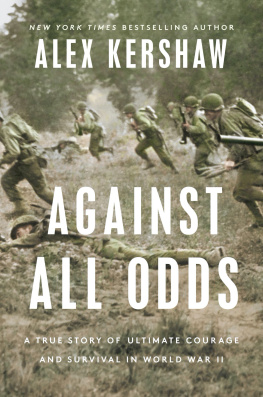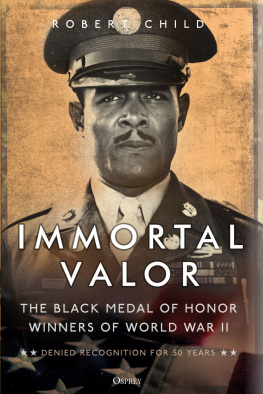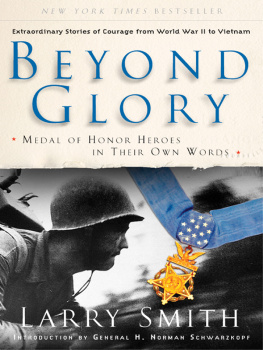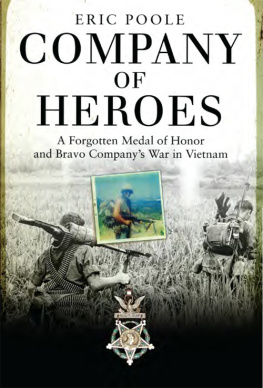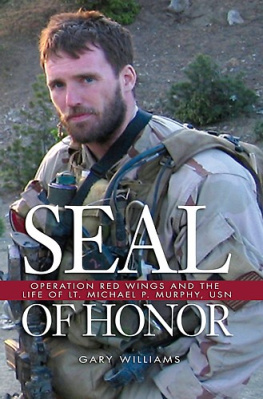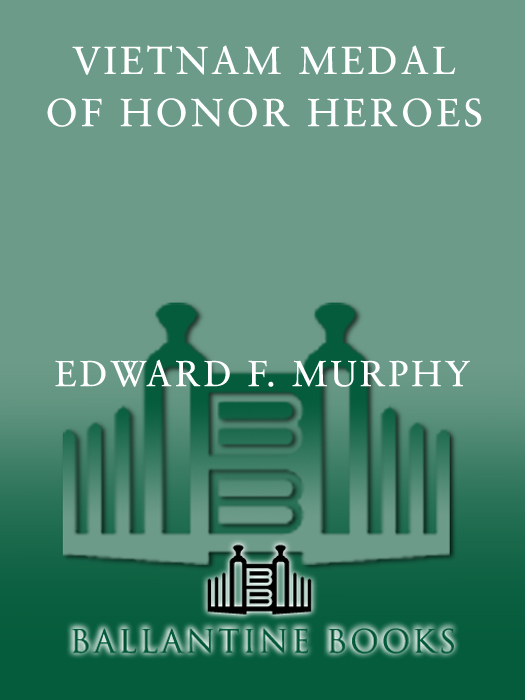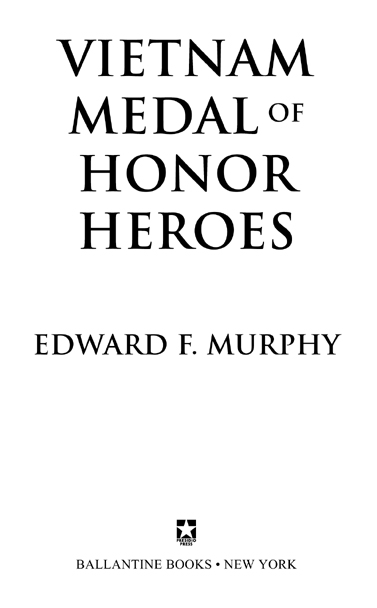Books by Edward F. Murphy
THE HILL FIGHTS: The First Battle of Khe Sanh
SEMPER FI: VIETNAM
HEROES OF WWII
KOREAN WAR HEROES
DAK TO: The 173d Airborne Brigade in South Vietnams Central Highlands, June-November 1967
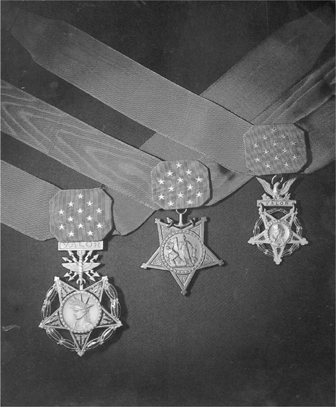
A Presidio Press Book
Published by The Random House Publishing Group
Copyright 1987, 2005 by Edward F. Murphy
All rights reserved under International and Pan-American Copyright Conventions. Published in the United States by Presidio Press, an imprint of The Random House Publishing Group, a division of Random House, Inc., New York, and simultaneously in Canada by Random House of Canada Limited, Toronto.
Map of Vietnam from The Hill Fights by Edward F. Murphy, copyright 2003 by Edward F. Murphy
Presidio Press and colophon are registered trademarks of Random House, Inc.
www.presidiopress.com
eISBN: 978-0-307-77617-4
v3.1
To Kay, who has made it all possible.
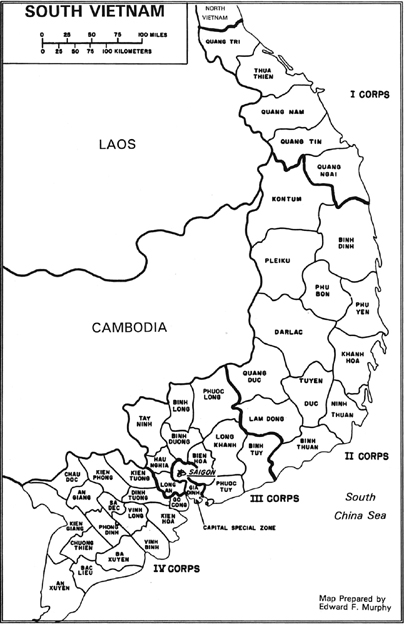
Contents
Preface
S ince this book was published in 1985 there has been such a large increase in information about the Medal of Honor and its Vietnam War recipients that the need for a revised, expanded, and up-to-date edition was obvious. In the last twenty years material about the war and the experience of its combatants has been produced in massive quantities in print and visual media. Included among these are a number of Medal of Honor recipients autobiographies that have substantially expanded our knowledge of how those men earned their awards and how the medal has affected their lives. In addition, detailed histories of specific campaigns and battles have been written that have shed new light on the events that resulted in Medals of Honor being earned, including a number of valorous deeds originally identified as having occurred in South Vietnam but that actually occurred in either Laos or Cambodia. Many of the living recipients have completed their careers and either retired or moved into new careers. Regrettably, a number of recipients have died since this book was originally released.
Six additional awards of the medal have been made since 1985. Although the armed forces have clear regulations that govern the time limits for submission of a Medal of Honor recommendation, the discovery of lost records, additional eyewitness accounts, congressional acts to waive the time limits, and the determination of wartime comrades to see these heroes recognized have made these late awards possible.
Since 1985 an unusual change in societys view of the Vietnam War veteran has occurred: Once disparaged by much of the public for their service, these same veterans now find themselves frequently praised and repeatedly thanked for their service. The nonveteran American citizen has come to understand and recognize the tremendous sacrifices the Vietnam combat veteran experienced.
Unfortunately, this newfound appreciation has created another problem. Untold numbers of nonveterans have presented themselves as Vietnam veterans. Even veterans who did not serve in the war zone have passed themselves off as hardened combat veterans. Regrettably, many of these wannabes claim to have been awarded the Medal of Honor. More times than not they have said that their medals were awarded in secret because their action occurred behind enemy lines while they were members of the elite navy SEALs or army Special Forces. Thus, they said, their names are not included on the official roster. Many gullible Americans, in their zeal to lessen their guilt for having disparaged the true Vietnam veteran for so long, accepted these fabrications without question, often elevating the pretender to a position of responsibility within veterans organizations, civic groups, academia, private companies, and even the government. The problem became so severe that in the late 1990s, Congress passed a law specifically aimed at punishing fraudulent Medal of Honor recipients and the Federal Bureau of Investigation has vigorously pursued the pretenders. One Vietnam veteran, B. G. Burkett, became so disgusted at the many phony veterans he encountered at veteran-related functions that he began to document their deceit and eventually published a book, Stolen Valor, exposing many of them.
As a result of all this new material and other changes, and because the original edition of this book has been out of print since 1990, I went to work on the new edition. That product is now in your hands. I hope it will not only serve to document the tremendous levels of heroism demonstrated by those American servicemen who served their country so well in Southeast Asia, but will also be the definitive reference for verifying authentic Medal of Honor recipients from the Vietnam War.
* * *
Americas military involvement in South Vietnam polarized this country as have few other events in our history. Despite the deep political divisions brought about by that involvement, most of the young American men who were eligible to serve in the armed forces accepted their governments call to arms and acquitted themselves extremely well.
While the United States may not have won the war in Vietnam, its soldiers never lost a battle. Individual soldiers demonstrated tremendous competenceeven heroismin pursuit of their countrys uncertain military goals.
In brief but bitter firefights in isolated rice paddies and in savage urban house-to-house gun battles that rivaled the European campaign of World War II, American soldiers, marines, sailors, and airmen routinely proved they could take the best that the Viet Cong and North Vietnamese regulars could dish out and still emerge winners. Gen. William C. Westmoreland, commanding general of U.S. forces in Vietnam from 1964 to 1968, called them, fighters and tough combatants.
Leading these youngsters was a solid cadre of senior enlisted men and officers, men who had devoted their lives to the defense of their country. Beneficiaries of the finest military training in the world, these dedicated career professionals provided a level of leadership and inspiration unprecedented in the history of warfare.
Two hundred and forty-four U.S. servicemen in Vietnam fought so bravely that their grateful nation awarded them its highest accolade, the Medal of Honor, for their conspicuous gallantry and intrepidity above and beyond the call of duty. (One naval officer, Capt. William McGonagle, was awarded the Medal of Honor for his gallantry in June 1967 when Israeli planes attacked his spy ship, USS Liberty, off the coast of Israel. He is not counted in these totals.) One hundred and fifty-three died performing the valorous act that earned them the medal. Others received permanently crippling injuries; several never fully recovered from the mental anguish caused by the war.
Americas youth fought the enemy in Vietnam as well as, if not better than, their fathers fought World War II or their grandfathers fought World War I.
Unlike heroes from earlier wars, though, the returning Vietnam heroes received scant public attention.


